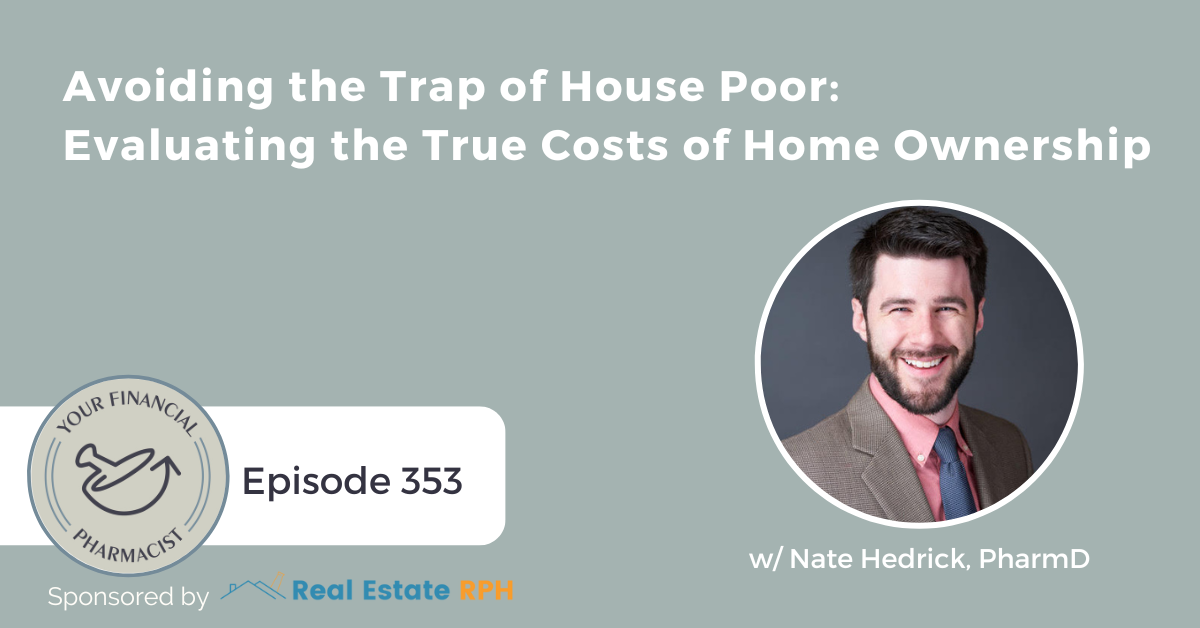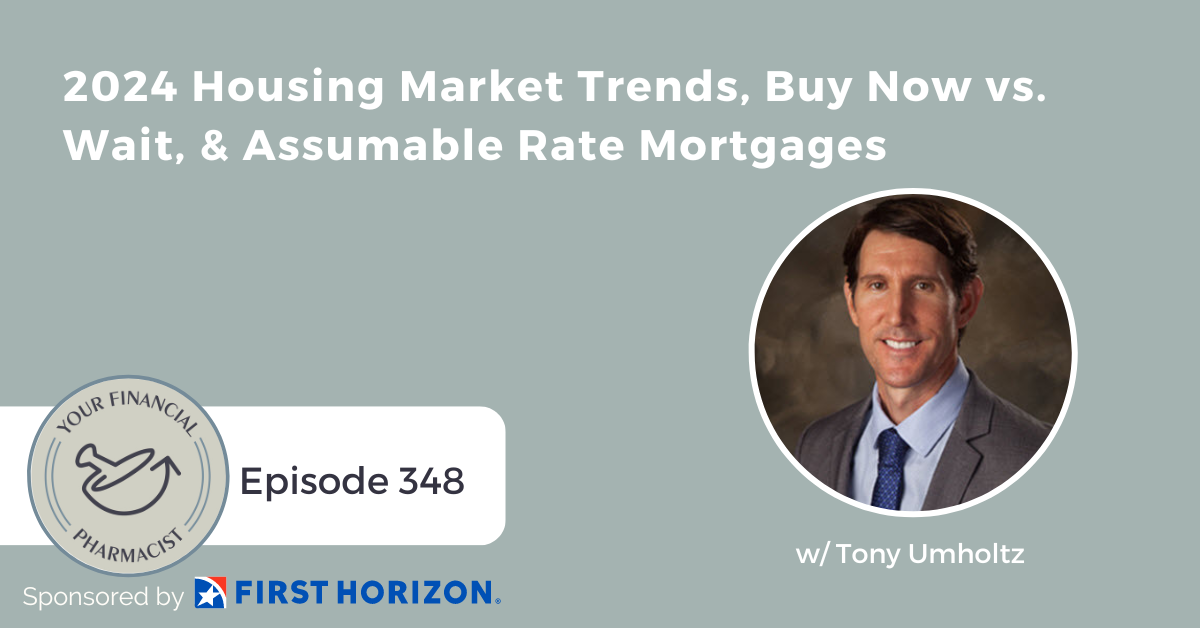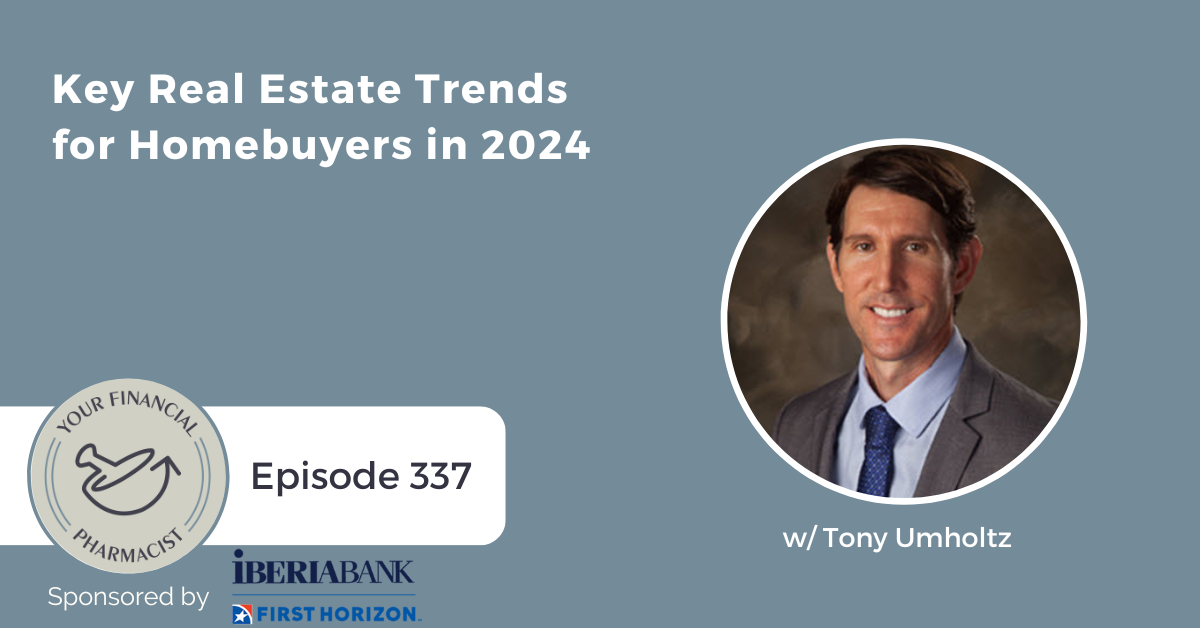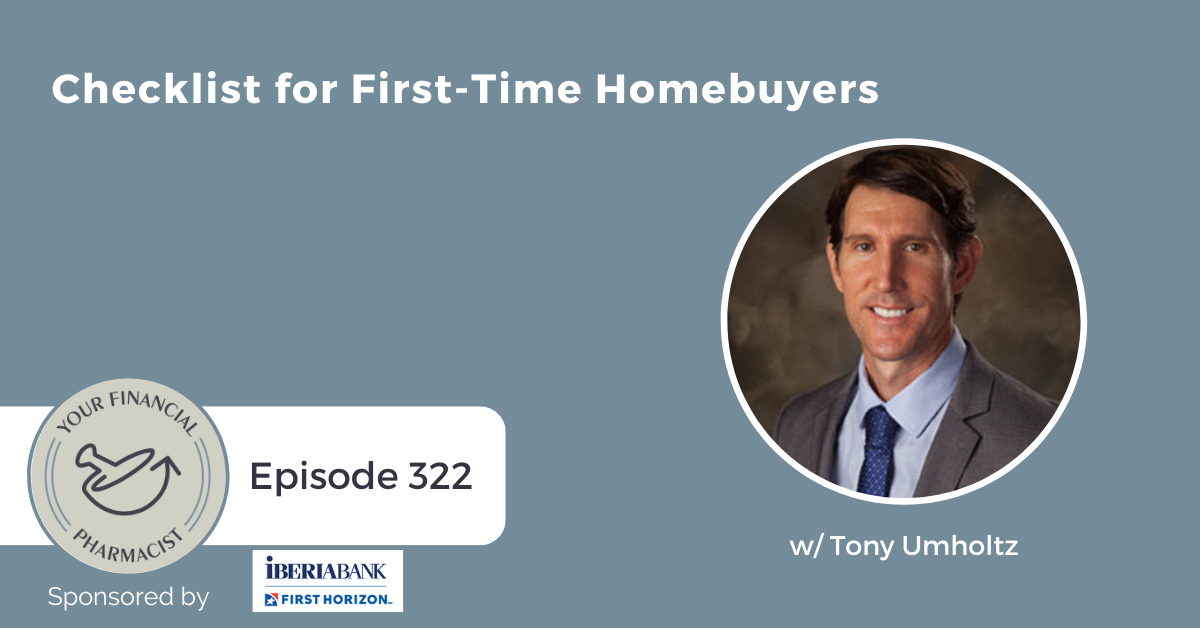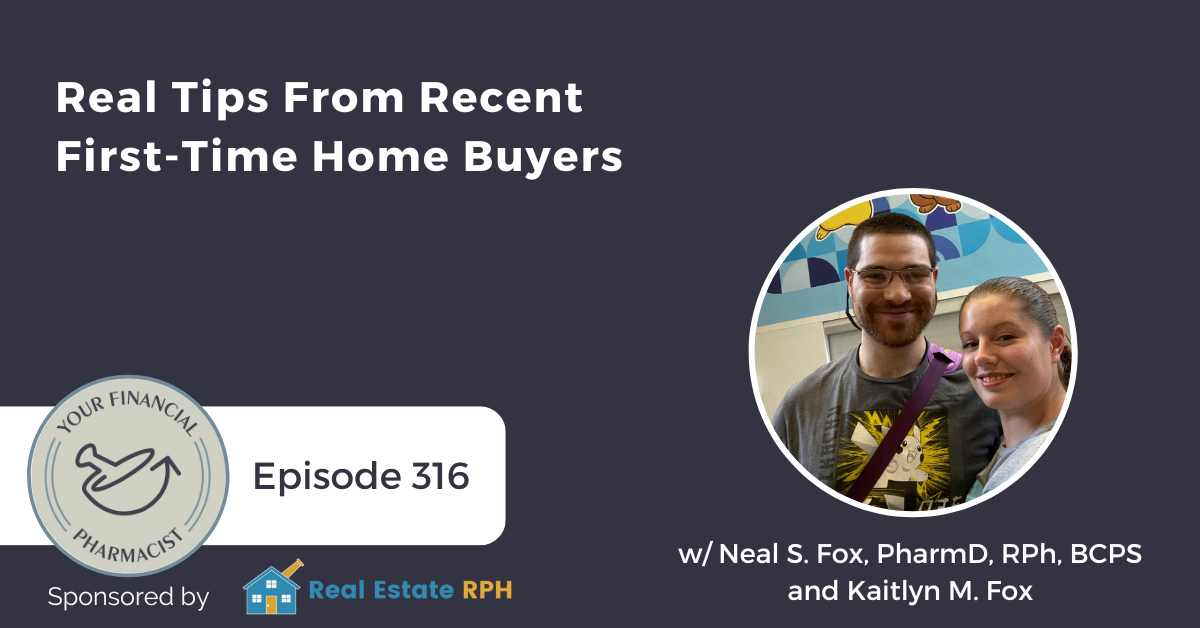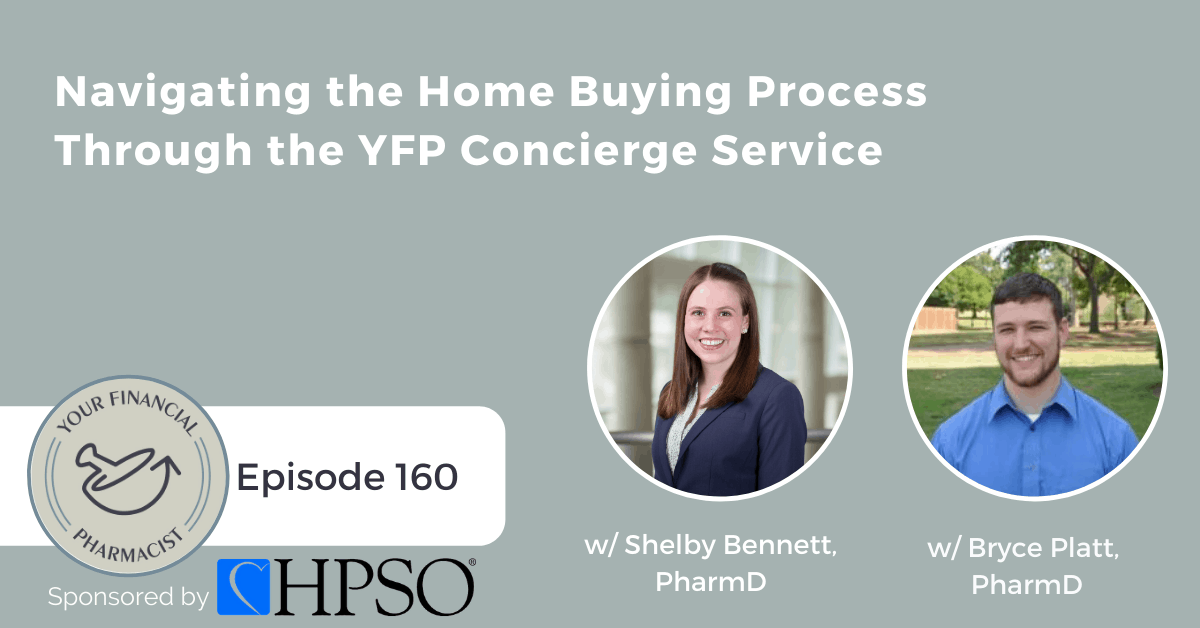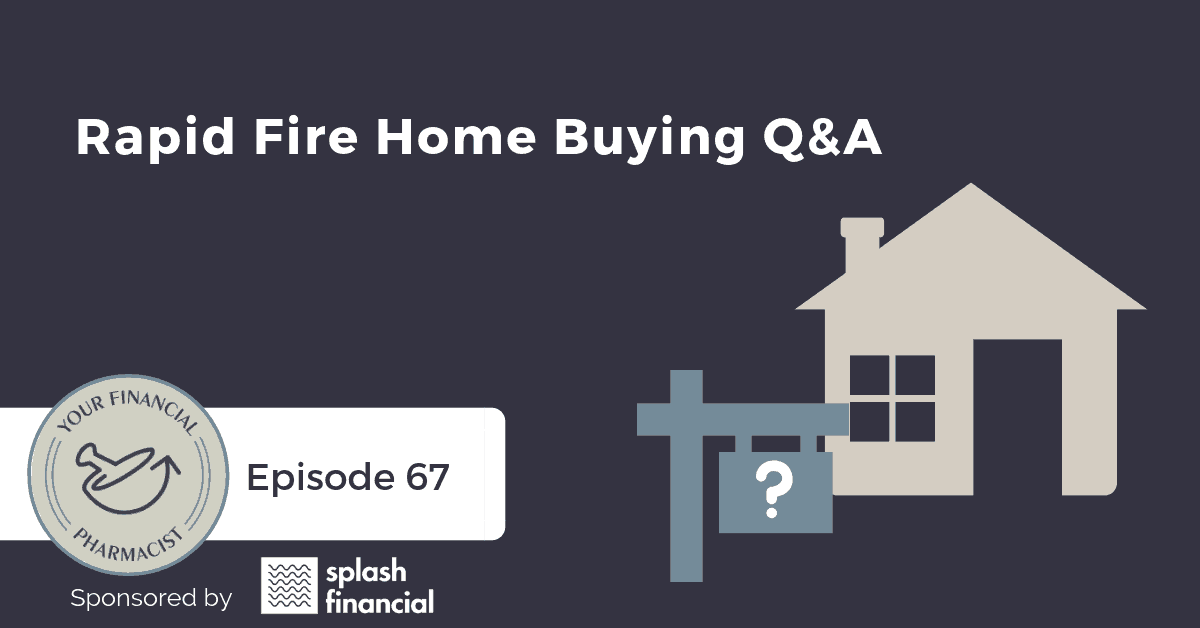Nate Hedrick, The Real Estate RPH, discusses how to avoid the trap of becoming house poor, the ever-lively debate of renting vs buying a home, the costs of buying a home, and how to determine how much house you can afford. This episode is sponsored by Real Estate RPH.
Episode Summary
In this episode sponsored by Real Estate RPh, host Tim Ulbrich chats with pharmacist and real-estate agent Nate Hedrick, CEO and founder of Real Estate RPh, all about the costs of home buying. Beyond the initial down payment and monthly mortgage payment, there are a lot of expenses with home ownership. Some expenses can be expected and planned for, others can catch you by surprise, as Nate and Tim have both learned.
Hear valuable insights and resources for pharmacists looking to purchase a home, covering topics such as down payment assistance options, planning for those unexpected expenses, and creative ways to help achieve the goal of home ownership.
About Today’s Guest
Nate Hedrick is full-time pharmacist by day, husband and father by evening and weekend, and real estate agent, investor, and blogger by late night and early morning. He has a passion for staying uncomfortable and is always on the lookout for a new challenge or a project. He found real estate investing in 2016 after his $300,000+ student loan debt lead him to read Rich Dad Poor Dad. This book opened his mind to the possibilities of financial freedom and he has been obsessed ever since. After earning his real estate license in 2017, Nate founded Real Estate RPH as a source for real estate education designed with pharmacists in mind. Since then, he has helped dozens of pharmacists around the country realize their dream of owning a home or starting their investing journey. Nate resides in Cleveland, Ohio with his wife, Kristen, his two daughters Molly and Lucy, and his rescue dog Lexi.
Key Points from the Episode
- Home buying costs and webinar sign-up. [0:00]
- Real estate market trends and industry news. [2:32]
- Financial impacts of home ownership and student loan debt. [5:27]
- Home affordability and financial planning. [11:07]
- Budgeting and financial planning for homebuyers. [15:11]
- Homeownership and financial planning creativity. [19:39]
- Homeownership costs beyond mortgage payments. [23:25]
- Homeownership costs and surprises. [27:00]
- Home buying options and resources. [32:59]
Episode Highlights
“I live this every day, just as another pharmacist also owning a home, right? You have to kind of account for all those costs. And it can feel like you get to the end of the month, and every bucket has been taken up by something. And you’re like, okay, how many, you know, how many pennies do I have left to rub together?” – Nate Hedrick [11:08]
“So I like tools that have that much more broad look, rather than trying to silo things out and saying 10% should go towards your car and 20% toward your house, because I just don’t think they work for everybody.”- Nate Hedrick [16:00]
“Like that’s the biggest thing with homeownership is – it nothing is consistent, every month is going to be different no matter what you do. And building in some of that margin building in that that error is just a great way to de stress that whole process.” – Nate Hedrick [29:18]
“I think what we’re really trying to prevent is, you know, as we talk about the theme here of avoiding the trap of being house poor and really evaluating all these costs that we don’t achieve one goal at the expense of a bunch of others.” – Tim Ulbrich [29:31]
“I think most people assume or think that they’ve got to have 20% down to buy a home. The reality is, there’s a ton of different programs out there and you don’t need anywhere near 20% down.” – Nate Hedrick [33:50]
“But there are a number of awesome programs out there that can help with down payment assistance, that can lower the downpayment that’s required and still have a competitive interest rate”. – Nate Hedrick [34:14]
Links Mentioned in Today’s Episode
- YFP Webinar on April 25th at 8:30pm EST “Your Checklist for Buying a Home in 2024” with Nate Hedrick
- Real Estate RPh
- YFP Home Buying Resources
- YFP REI Podcast: Navigating the NAR New: Insights for Real Estate Investor
- YFP Planning
- Subscribe to the YFP Newsletter
- YFP Real Estate Investing Facebook Group
- Nate Hedrick on Instagram
- Tim Ulbrich on LinkedIn
- YFP on Instagram
- YFP Facebook Group
- YFP Disclaimer
Episode Transcript
Tim Ulbrich 00:00
Hey everybody, Tim Ulbrich here and thank you for listening to the YFP Podcast where each week we strive to inspire and encourage you on your path towards achieving financial freedom. This week our resident homebuying expert Nate Hedrick joins the show to answer the question how much house can I afford? We discuss how to avoid the trap of becoming house poor, the ever lively debate of renting versus buying, and what costs to consider beyond the down payment and monthly payment, which includes principal interest, taxes and insurance. Whether you’re a first time homebuyer or already own your own home. Our hope is this episode will help you evaluate how home ownership fits as one puzzle piece in the rest of the financial plan. Speaking of homebuying, Nate will be joining us for a free webinar coming up on Thursday, April 25, at 8:30pm/Eastern titled, Your Checklist for Buying a Home in 2024. During this webinar, Nate will share what you need to know about purchasing a home in 2024. And we’ll walk you through important steps to take in your home buying journey to make the process easier to navigate and understand. You can sign up for this webinar by visiting yourfinancialpharmacist.com/homebuying2024. Again, that’s yourfinancialpharmacist.com/homebuying2024. All right, let’s hear from today’s sponsor the Real Estate RPh and then we’ll jump into the show.
Tim Ulbrich 01:20
Are you planning to buy a home in the next year or two? With the state of current home prices and mortgage rates the home buying process can feel overwhelming. But what if you can leverage the knowledge and ongoing support of someone who has worked with dozens of other pharmacists through their home buying journey all at no cost to you? I’m talking about Nate Hedrick at the Real Estate RPh. Nate is a pharmacist who has been a partner of YFP for many years now and offers a home buying concierge service that can help you find a high quality agent in your area and support you throughout the entire process. So head on over to RealEstateRPh.com or click on the link in the show notes to schedule your FREE 30 minute jumpstart planning session with Nate.
Tim Ulbrich 02:05
Nate, welcome back to the show.
Nate Hedrick 02:07
Hey, Tim, always good to be here.
Tim Ulbrich 02:08
Well, this is the time of year where things start to really heat up on the home buying the home selling side of things, although you know, we continue to be in this in this unique cycle that is a little bit of an out-of-whack of supply and demand. We’ve got obviously interest rates still where they’re at. So as you go into the spring season, what’s normal, what’s not normal for you this time of year?
Nate Hedrick 02:32
I guess the only normal thing is that it is it is getting busy. My schedule is quite busy right now in the spring with a lot of buyers, a lot of sellers, which is great. I mean, it’s it’s great for our business, but it’s still a bit of a weird time, right, we’ve got interest rates in kind of a weird spot, still have a lot of low inventory out there. So people that are trying to find the right home, it’s more difficult. And then we’ve got things going on with the industry in general that that are just making it a bit of a weird, weird market right now.
Tim Ulbrich 03:03
Absolutely. And before we get too deep into the topic, Nate for any of our listeners that are, you know, in the moment, looking to buy a home, looking to sell a home, wanting to make sure that they get out in front of this, or maybe even those for those that are listening to saying, Hey, this is a three month thing, a six month thing, we you and I both know how that goes. Things can move quickly. You know, we want to make sure they get connected to you and your services, what you offer through the Real Estate RPh concierge service, they can do that by going to yourfinancialpharmacists.com. We’ll talk more about this as we go throughout the episode at the end as well. Click on home buying and from there, you’ll see an option to find an agent get connected with eight and beyond your way for for this big decision. Certainly that that it is we want to make sure that they have the resources available to make a good decision.
Nate Hedrick 03:49
Yeah, it’s funny, we even I got an email just this morning from a client that they met with me in late January, we match them up with an agent within a couple of days. And within two weeks, they were under contract and they just closed. So like I mean, it was just, it’s lightning fast when you’re in that in that space. And even if you’re three months out, it all of a sudden those three months get eaten up. So better to schedule that early and get on the horn with us so we can get you in the right spot. So yeah, definitely check that out.
Tim Ulbrich 04:14
Nate, I’d be remiss if we didn’t ask you big news that came out this week settlement by the National Association of Realtors. Obviously, you as a real estate agent, if our listeners don’t already know that, potentially something that’s going to impact you impact the industry at large. There has been news flying around all about this headlines everywhere. And I think it’s one of those things. It’s hard to really assess like what actually is going on? What’s the impact right now? And what’s the potential future impact? And I know you and David just covered this on the Real Estate Investing Podcast, episode 118. We’ll link to that episode in the show notes so folks can dig deeper on this topic, but give it give us the Cliff Notes of what’s going on and where we’re at.
Nate Hedrick 04:55
Yeah, I think it’s definitely worthwhile to try to get away from the media noise for a second on this because what I’m seeing out there is all the headlines are speculating what this is going to do to the industry rather than what’s actually occurred. So the very brief version is that several months and even a couple of years ago, there was a lawsuit against the National Association of Realtors, by some parties that are part of a consumer advocacy group. And essentially, what they were alleging was that there was there’s some sort of price fixing going on that basically sellers were told, you had to offer a commission to buyer’s agents. And if you didn’t offer them 3%, or whatever, then like you couldn’t work together, right. And that’s, that’s not really true. And the NAR has basically said, like, we’re not admitting that we did that, because we haven’t been and they’re even in the settlement, they’ve admitted no wrongdoing at all. But essentially, that’s the allegation. And what is what they decided to do is, rather than continue to go through expensive litigation, the NAR has decided to settle and to make some changes, so they’re gonna pay out about $418 million dollars over the next four years to consumers. And then they’re gonna make some big changes in terms of how agents and the MLS can advertise and for, for commissions, so they are no longer able to advertise for buyer agent commissions, and buyers are going to have to work with and this is the big change for buyers out there, buyers are gonna have to work with an agent under a contract, you’re gonna have to have a contract in place with that agent. Gone will be the days of just showing up, writing an offer with whatever agent and then like figuring out the contract stuff later, like that is not going to work anymore. You’re going to have to be established with somebody, if you want to work with an agent, because the way we get paid is going to change basically. So it’s a lot of shake up. We don’t know exactly what’s going to happen yet. But some of those details are starting to come forward here and we’re at the end of March already. And it’s it’s, it’s heating up.
Tim Ulbrich 06:46
So for those that are listening, whether it’s you know, people that are looking right now or thinking about buying the spring or summer, you know, how much of that is going to impact them right now? Are we still in this wait, wait and see pattern of when some of the changes you’re talking about are going to take place?
Nate Hedrick 06:59
Yeah, so a lot of these changes will not go into effect until probably July and even beyond. That’s really the deadline they’ve established for this. I keep in mind again, as you and I sit here and record this, the court has not even accepted the settlement yet, right. The NAR has basically said this is what we’re interested in settling on, the court still has to accept that settlement. So a lot of this is to be determined anyway. But if it all shakes out the way that they’ve proposed, then July is when this will start to make a difference. And again, if it goes, if it goes the in a bad direction, I guess for buyers, I’ll put it that way. What will likely happen is that buyers are just going to have to be a little more savvy about about that early conversation with their agent. Who is paying, how am I paying? Am I paying? Is the seller paying? Like how are we negotiating that? And how does it affect my ability to put in offers because those are all things that are going to change in in some capacity here in the next couple of months.
Tim Ulbrich 07:52
So again, you and David covered this on episode 118 of the YFP Real Estate Investing Podcast, deeper dive, we’ll make sure to link that in the show notes. And of course, we’ll keep the community up to date, as we have more information that is rolling out. And you know, we get past some of the short term news and the headlines and actually start to see some of the implementation of some of these things. So today’s theme, Nate is: Avoiding the Trap of House Poor: Evaluating the True Costs of of Home Ownership. And, you know, as you and I were planning for this episode, we were talking about, hey, for those that are looking, this is a good opportunity to make sure that that homebuying, that big rock that is a part of the financial plan, is put in the right context, right, about their goals that we’re trying to achieve, so that we have the room to do those things. But also for those that own, already own. You know, I talked with pharmacists on the regular that, you know, maybe they’re three years in, five years in, 10 years in, whatever it may be, and just over time expenses have increased. Maybe they’re perhaps still paying on student loans or other things, trying to save and invest more for retirement and really feeling like in that home, they’re in the situation where hey, I don’t have a whole lot of margin, I’m feeling house poor because of that. So whether someone is a hey, I’m going to buy or they currently own I think they’re gonna find this episode helpful. Now, I want to get your take on five things that I see on the regular that are financially impacting, you know, especially new graduates, but I think it transcends even beyond that in a much greater way than when I graduated back in 2008, than when you graduated as well. You know, first student loan debt, we’ve talked about that at length on the show. When you look at what graduates are coming out with is in terms of an average and what that means for a monthly payment. You know, that can be standard 10 year repayment on an average debt load, we’re looking at $1800 to $2,000 per month.
Second, of course, housing costs we’re gonna dig deep into that on today’s episode, but, you know, we’ve seen the rise in interest rates and the rise in home prices. We see the impact of that on a monthly payment. You put those two together, right, that’s a big portion of one’s take home pay. You know, we also see the third thing I’m thinking about is just car loans and interest rates on the car loans. Of course inflation is the fourth thing, although we’re starting to see that, you know, tamper down a little bit, and then five, I think one that we don’t talk enough about is childcare costs. And, you know, you know that well, and just the costs that come from, you know, daycare and other costs associated with with children and growing family. And so, you know, at the end of the day, what I want to get your take on is do pharmacists make a good income? And the answer is yes, objectively they do. Right? If you look at the median household income in the US, pharmacists make on average $50,000 or more above that. So objectively speaking, yes. However, when you start to add these things up, right, when you start to look at student loans, and housing costs, and childcare costs, etc, that’s where we often run into the situation of, hey, I make a good income, but I don’t feel like I’m progressing. I don’t feel like I have a whole lot of breathing room, because of some of these big pieces of the puzzle that can have an impact on the financial plan. So thoughts from your seat individually living this, and then certainly working with many pharmacists that are in that position, looking to buy trying to figure out how the house budget fits into the rest of the plan?
Nate Hedrick 11:06
Yeah, I mean, you’re spot on, right? I live this every day, just as another pharmacist also owning a home, right? You have to kind of account for all those costs. And it can feel like you get to the end of the month, and every bucket has been taken up by something. And you’re like, okay, how many, you know, how many pennies do I have left to rub together? Right? It’s just, it can feel like that, right? Especially if you’ve not set yourself up for success. And so I definitely feel that on my own personal finances, but then I also see with clients to where they will I see this all the time where someone will look at a neighborhood or look at an area of the country. And they don’t even ask the question about budget, they just say we need three bedrooms. And where I’m looking at $800,000. And the question is not, can I afford an $800,000 house. It’s just, that’s what we need. And so that’s what we’re gonna buy. And I think that’s really easy to get into, right? Like we love where we live. And that’s not unreasonable. But rarely do we step back and evaluate? Okay, am I okay with paying more to live in this particular location? Or, you know, should I consider a relocation? Or should I consider sizing down and having the kids share a bedroom? Like, all those things are not questions that I often hear. It’s usually, how can I push this? How can I lower that down payment? How can I get away from this expenses now and push those push those things down the road? So I think we’re kind of geared toward that. And having these conversations like you and I are having is how you start to reset that that metric a little bit.
Tim Ulbrich 12:33
Yeah. And I think one thing that I hear there, Nate, which is hard to implement, is just some of the mindset around these decisions. No judgment here whatsoever. Remember, Jess and I talked at length about, you know, we had an expectation coming out that we’re going to buy our first home, at the level which my parents took 20, 25, 30 years to get to, like, you know, and that was where our mindset was, and we made several decisions and some mistakes along the way. And, you know, we probably purchased before we were ready, not sure we really had enough, you know, down in the home, we ended up paying PMI that I didn’t understand how that was structured in a loan. You know, if we had more time, I could give you the list. Right? But but the point being, is I think there is a mindset component here. And you know, sometimes we don’t necessarily like the outcome or the decision when we look at the numbers. But what we’re trying to do, as we talk about this, is really take a step back and say, hey, how does the home purchase fit as one piece of this bigger puzzle, and human behavior, myself included, I think you included as well, as we want to go into the silos and make financial decisions. And especially when talk about home purchase, it’s exciting. It’s emotional, right? There’s a lot of things that are involved. But when we’re talking about a rock that we’re going to put in place that might take 25, 30, 35, 40% of our take home pay, and we’re fixed in that for 30 years, okay, we’ve really got to do due diligence, so that we make sure when we look at other parts of the financial plan, right, saving, investing for the future, pursuing other financial goals, making sure we’ve got breathing room, making sure we have margin to experience and to give and to do other parts of the plan. And so naturally, Nate, the next question is, well, if we’re talking about trying to prevent this, what is that affordability calculation? Like as you think about it, in your own plan, or in working with, you know, other buyers as well? How do you think about what what is that number? You know, is it is it a percentage of take home pay, is it you know, obviously, the what the individual thinks it is versus what the bank thinks it is, can be two very different things. Talk us through that a little bit further.
Nate Hedrick 12:34
I think that you could Google, “how much house can I afford?” and get 72 different answers, right, with all these calculators and metrics and back of the napkin math ideas, and the answer is there is no answer. However, you hit the nail on the head a minute ago and said, avoiding thinking about this decision as a silo, right? I think it’s very easy for people to say, well, I read, you could get 25% of your money toward housing. So we’re just going to do that. And that’s our number. And that’s it. Right? Or 30%, or pick, pick your favorite number, right? Where I think that becomes a problem is that especially like ourselves, right? When I, when I came out of school, a ton of student loan debt, those numbers are not accurate for somebody with a ton of student loan debt, they’re not accurate for a ton of credit card debt, they’re not accurate. If you’ve got, you know, childcare expenses that are going to be cropping up down the road, like all those things can can drastically affect those numbers. And so what I like to do, or what I advise my clients do, is to do something like the 50-30-20, which I can cover in a second, but but something that it doesn’t matter which one it is, as long as you’re taking all of your expenses as a as a bigger piece, right? So what I like about the 50-30-20 rule is that 50% of your money goes toward needs; 30% toward wants and 20% toward net worth building. And what I like, especially about that, is that that big piece of the pie that 50% It’s all your needs, food, car, medical expenses, childcare expenses, like whatever those things are, if you have to have them, then you have to include it in a number. And if all those numbers are already big, like what if your need is student loan payment, right, I have to pay that every single month, I can just avoid that. So it gets factored into that. And it can adjust those housing numbers down rather than just picking a flat 25% or whatever. So I like tools that have that much more broad look, rather than trying to silo things out and saying 10% should go towards your car and 20% toward your house, because I just don’t think they work for everybody. And I think they’re too they’re too broad.
Tim Ulbrich 16:39
Yeah, and I think to your point there, Nate, you know, obviously, everyone’s situation is different. And even, you know, let’s take two, two student loan borrowers, right, both have $200,000 of debt, how they pursue their loan repayment strategy could drastically impact the cash flow they have, right? If one person says, hey, I want to aggressively pay these off in five, seven years, the other person is on a public service loan forgiveness strategy on an income driven repayment plan, where they’re trying to maximize tax free forgiveness- night and day of what are they actually putting out towards the student loans in terms of cash flow? And what what do they have available? You know, other things I think about in terms of where are they at in terms of savings and retirement plans and goals? You know, so is, is pharmacy a second career, and they’re trying to play a little bit of catch up on retirement? Are they thinking early retirement? And maybe you need to save a little bit more aggressive, right? So so many factors that go into this equation, but I think using something like you’re suggesting is a good place, because it helps us figure out, okay, how does this payment fit into that bucket into that 50%? And I’m guessing we often get that number, we’re like, hey, we don’t like it. We don’t like what, you know, the budget is going to support it. And I think that that’s really where the rubber meets the road. But what’s helpful about that is 99 out of 100 times when you’re running your own numbers and trying to figure out what is that housing cost within that 50%. Typically, the banks can approve you for much more than that. Right. And so they’re the the take home point being is that they’re not concerned about your 50-30-20 budget in the same way that the individual would be correct.
Nate Hedrick 18:13
Spot on. Right. I never forget the first time that Kristen and I got approved for a mortgage. And the bank was like, Well, how much house you want to buy? And we’re like, I don’t know, how much can like, what will you give us? And they just do this, this quick math. And it’s like, here you can afford $600,000. And I think our budget at the time was like $250. But like, they don’t care, right, they’re looking at the numbers very differently. They’re just looking at some of the debts that you have, they don’t care if you have $0 leftover at the end of the month, the goal is to make sure that you can make those payments and just make those payments. And so that’s how they’re going to set it. So you have to be your own advocate when it comes to setting that budget and not letting the bank do it for you.
Tim Ulbrich 18:51
Yeah, I always say Nathan, the bank is looking out for themselves have a foreclosure risk? They’re not looking out for are you on track to achieve all your other financial goals? And how does this purchase, that’s an ill intent, that’s just the way the way the system is set up, and then them mitigating the risks that they need to mitigate. So you know, I think the natural follow up then, Nate, and here we are, you know, we probably should have started here that, you know, we’re not having to buy a home in 2024 where homes are at the prices they are and interest rates are where they are so different time right then when we bought a home and it’s worth saying, but the natural counterpoint is, well, I don’t want to rent either, you know, rent has been going up we know the what the data has shown in terms of rent prices going up over time and you know, I feel like I’m I’m just throwing money down the drain. I’m not building equity, right. I’m not building equity if I don’t have a house. So what do you say to that person who really feels like yeah, I hear you. Like it’s too much in terms of the percentage of my take home pay are within that budgeting system you just described, but also feel like it’s not like wrench deep. Right. And I really feel like I’m not necessarily building any equity as we continue to rent.
Nate Hedrick 20:01
I think it’s tough because some of this, at some point comes down to more of an emotional decision, right? Like, it’s just I’m sick of renting. Even if financially like, you still need to stay in that boat for a little bit, while longer just if you do the math, it’s hard to make that decision, right? I mean, I absolutely get that and I was in the same boat that you were like, we probably bought sooner than we should have. We just wanted to buy, we kind of made it work, right. But at the same time, we kept our budget very reasonable, so that we could do that, right, there are ways to mitigate that risk. If that’s the choice you want to make, right? You, you can do it, if you aren’t pushing everything, right, you’ve got to take some compromises somewhere else. So if you’re looking at it, you’re saying, look, we have to be in a home, I don’t want to be renting anymore, well, then you gotta choose an area where the home prices are affordable. I mean, just that’s all there is to it. Right? If you are a new practitioner in downtown San Francisco, and the homes are $1.5 million and above, like, it’s just not as viable as Cleveland, Ohio, where I’m from right or something like that. So you have to be able to take some sort of compromise. If you sit there and say, look, the the overall goal is to be in a home that we own. And you have to find a way to do that. It’s not just in it has to be in this market and has to be six bedrooms, and it has to be 400,000 square feet and all this right, it just you have to be able to adapt, and then do the there are other ways to get creative, too, right? Think about house hacking, for example, buying a property that you can have somebody else renting out with you, then you can mitigate some of those costs. Or looking for down payment assistance programs that are out there, right? There are a ton of grant programs for new graduates that help with down payment assistance, like you can get creative. You just have to go out and do that. Right. I think the old Rich Dad Poor Dad adage, it’s not I can’t afford a house. It’s how can I afford a house? And sometimes you have to get creative how you do that.
Tim Ulbrich 21:50
I think that, you know, it’s the creativity is an important part of that. I think this comes back to mindset you know as well. I think there’s a script that many of us have been told, I know that I don’t remember my parents saying this, it was just something I always believe, which is rent is bad. Homeownership is good. And, you know, as with most things, right, there’s, there’s more than option A and B. And when we look at homeownership, depending on your situation, depending on the part of the country you’re living in, depending on cash you have available for down payment depending on rent rates, right, you know. Ramit Sethi talks a lot about this on his podcast living in I think he’s in New York City, where it’s like, doesn’t make sense, like, you know, continuing to rent in certain markets, like, yeah, it does make sense. And you’ve got to figure out to your point, other parts of the plan, we’re sure maybe he’s not building, you know, equity in the home, which for many people becomes one of the greatest assets they have as a part of their financial plan. But for him, and for others, in higher cost of living areas, you adjust and pivot, you know, and figure out what that looks like.
Nate Hedrick 22:45
It’s funny, you mentioned that I was even just talking to a pharmacist two weeks or three weeks ago, and he rents right now, he wants to buy his first house, but he wants it to be an investment property. So he’s buying in a different location continuing to rent, so you can build equity in a home, just not the home that he’s living in. So he’s still getting into the real estate game, but not doing in a way where he’s making a bad decision just because of where he wants to live. Right. So there’s, there’s a lot of ways to get creative, I wish that we could just do it all up front, but you have to kind of pick and choose when it comes to your financial plan.
Tim Ulbrich 23:16
I like that, Nate. Creativity, I feel like it’s something we’re often lacking in, in the financial plan, right, because we see a path maybe that our parents had or others had, and it’s option A option B. But typically, there’s there’s more than than just those two. Let’s talk about some of the about surprise, but maybe costs it often gets overlooked or underestimated, especially for people that are going through this, you know, the first time you know. I remember vividly, I’ve shared on the show before Jess and I bought our first home and these numbers are laughable now saying them out loud in today’s market, but 2008/2009. So then post residency, we were paying rent $1,100 a month, I remember writing that check every single month for a townhome. We were looking to buy a home and you know, I went did the principal and interest calculations. I don’t think I factored in taxes, insurance. Maybe I did. And I remember seeing it was going to be somewhere right around there actually a little bit less. And like that was the end of my analytics. It was like buy, buy buy. And you know, I think that that’s very common, you know, that you look at, hey, what’s going to be my monthly payment, principal interest. Maybe people are thinking about property taxes and insurance. But that’s really the table stakes. Right? That’s the starting point. But talk to us about maybe those other things, either short term or long term that tend to catch people off guard, where sure, maybe that payment starts at 25% of take home pay but we quickly realize if it’s all in cost, it’s actually a lot lot more.
Nate Hedrick 24:43
I mean, I think you nailed it with the insurance and taxes. I did the exact same thing you did. I ignored them and pretended like they weren’t there and then also the bill showed up I’m like what was I thinking? But you’re right there are a number of other things. I’ll never forget we moved into our our very first his house. And one of the one of the reasons they moved again, this is why home buying is emotional. One of the reasons we moved is we wanted to space for our dog. We had a one year old dog wanted some space for her, wanted some space for ourselves. And so we’re like, oh, let’s get this big yard. Well, the very first thing we did when we moved in was like, shoot, we need a fence. And so we’re like, well, we got a fence in the whole thing. And we have, we’ve over like an acre, we have actually almost two acres. And so we wanted to fence in an acre and all of a sudden it was like a $10,000 fence. And it’s like man – nowhere like that would have covered rent for a whole year at the old place. But we didn’t even factor that in because you just it’s just the stuff that you don’t think about. So it’s everything like that. I mean, I think it’s this the surprises, the things you don’t anticipate. But it’s also the regular stuff, you know. Stuff breaks, water heater goes down, a washing machine, dishwasher, and all those things, you don’t have a maintenance department to call anymore. You have to you know the landlord to check in with right you have to fix it yourself and get it taken care of. So I think I think those are the some of the big things. The other thing that I think creeps up and it’s on top of mine right now for me because we do this thing here in Cuyahoga County in Cleveland, Ohio, where every three years, the county assessor will come out and they’ll reassess property values, and then they’ll adjust your taxes as a result. Super nice. Not not like that everywhere. Some places, they lock you into that lower rate, but we get reassessed every three years. And so every three years, my property taxes go up in some fashion. And sometimes it’s more, sometimes it’s less, but it’s always on the up. So even if we did that math nine, almost 10 years ago, right? It all worked out, then things have gotten more expensive, right. And so it’s, it’s all those little things that start to creep up over time that you don’t have the backup plan for. Now, I will say this, rent has also been increasing. So it’s not like everything’s immune to that, right. You might have started renting a place for $1,000 a month, or $1100 dollars a month. And now it’s 15. Right. And so that that’s, that’s still there as well and has to be factored in. But with a home, it just feels like all of it is on your shoulders. And it’s really just when it comes down, you have to be the one to take care of it.
Tim Ulbrich 27:00
And I had the same thought. We had a reassessment, actually, both on the commercial property, which was outrageous, but on the primary home, it was not as bad, but it got me thinking the same line of thinking you are, which is the tendency when we buy and even again, no judgment when we bought our second home here in Columbus, you know, I remember those conversations where Jess and I were kind of looking at, okay, where where do we want to be monthly payment wise, that we really feel like we’re comfortable within the budget, but you’re thinking about it in that moment in time. Right. And, you know, hopefully, incomes are going up to help offset this. But this is one of the challenges we’re seeing, I think in some sectors of our profession is that they’re not or if they are and you factor in inflation and other costs, maybe they’re not to the degree that we actually think they are even if that number is going up. And so you look at things like property taxes. Homeowners insurance is something that’s kicked up here in the last couple years more significantly, and I think we’re going to continue to see that. And then you highlighted well, you know, the fence example that’s given. We did the same thing. We didn’t have that big of a fence. But you know, I remember it was a fence, it was repairing the deck, it was the lawn maintenance, it was because we never owned a home before, you know, all of the lawn equipment, things that you had to get for the first time and, you know, obviously furniture, you look at the home and you’re like, Oh, it’s fine. We like it. And then you get in and it’s like, well, you know, what about this? And you know, what about that, and those things seems small. But you know, those add up quickly. And it goes back to the theme of where we’ve been going throughout the episode, which is, hey, will you go back to your 50-30-20 or whatever type of budgeting system you’re using, you know, margin breathing room, knowing that up is going to be the trend, whether it’s property taxes, homeowners insurance, upkeep, remodeling the home, a roof, hot water, tank, AC, whatever, it’s gonna go up, and we want to have margin to be able to plan and save for those expenses.
Nate Hedrick 27:01
If you want a way to ensure that you’re financially less stressed, build in that margin upfront. It just makes it so much easier when you have that surprise, like if you have $1,000 water heater that needs to be replaced, but you’ve built in $1000 extra dollars in your budget every month. It’s just a blip. Like you don’t have to have this emergency fund that you’re cracking open and like it just it feels so much easier to have those those bumps because it’s not consistent. Like that’s the biggest thing with homeownership is – it nothing is consistent, every month is going to be different no matter what you do. And building in some of that margin building in that that error is just a great way to de stress that whole process.
Tim Ulbrich 28:53
Yeah, I think what we’re really trying to prevent is we you know, talk about the theme here of avoiding the trap of being house poor and really evaluating all these costs that we don’t achieve one goal at the expense of a bunch of others. So you know homeownership has a ton of value. We’ve talked about it on the show before. We’re both big believers in homeownership and that it has tremendous value but also we don’t want to be in that home and then like hey, we were stressed about taking the trip or the vacation or stressed about you know not being able to stay on track with retirement or other goals along the way as well. Utilities, Nate, is another one I was just thinking about our utilities keep creeping up. And it feels like that’s another one that you look back two three years and you’re like, wait a minute, what’s, what’s the heating bill? Compared to what it was?
Nate Hedrick 30:14
I have a good story about that, too. I don’t know if I’ve told this on the podcast before but early on, when we lived in our house, the water company wanted to install this wireless water meter. And I got like one letter about it. And it was like, hey, call us schedule a time for us to come out install this wireless reader that way we can see remotely like what your water usage is, and like, we’ll come out and install it. It’s free, just let us know. And I ignored it because I was busy and everything else. And so we stopped getting water bills. And I didn’t notice. And then about a year and a half in of like that, that notice coming? I was like, Man, are we even going to water bill No, in a while. So I logged in. And I cannot believe to this day, I cannot believe that didn’t stop our water. We were over $1,200 behind. I think my agenda is we just I hadn’t been paying attention to it. And it wasn’t an auto bill. And so like one of those $1,000 bumps that just showed up. So I mean, again, I’m shocked they never turned off our water. But that was that was an example of that creep from the utility company for sure.
Tim Ulbrich 31:16
Surprised they weren’t knocking on your door.
Nate Hedrick 31:17
I know, right?
Tim Ulbrich 31:18
So speaking of…you made me think… hey, this is good story hour when Nate and Tim, but as we’re talking about cost of home ownership you don’t expect. I don’t know if I told you this one – a few years ago. So in our basement, we’ve never had a water softener system. So and, and full disclaimer, I am inept, completely inept when it comes to anything. So just keep that in mind for anyone who’s judging me as we’re talking about this. So never had a water softening system. The boys- we’ve got four boys are constantly down there throwing balls or whatever. Well, for those that have one, you know, there’s a backwash valve that will come on periodically to flush the system. Well, they had hit the backwash valve. And I don’t know you’re not down there enough? I’m not paying attention. I don’t even know what this thing is. Is it doing you know, whatever. So come to find out like it had turned on. It’s just been running. I don’t know for how long it’s been running. So I realized this, and then sure enough, like, I might have been a week, 10 days later, I get a bill for $4000. And I call it the and for those that have looked at your water sewer bill. Any water usage you’re using, you’re doubling up as sewers. So I call the Franklin County Department of sanitary engineering and I’m like, hey, listen, this is what happened. You’re not gonna believe it. I get it. I’m an idiot. And I was like, hey, I’ll I’ll write a check tomorrow, if you let me pay $2,000. And they were like, super gracious.
Nate Hedrick 31:21
Wow, cool.
Tim Ulbrich 31:27
Yeah. And so again, write things that come up that you’re just like, I never thought that this expense might actually exist. Jess and I have a running mental log of all of the damage slash expenses that have happened as a result of the boys.
Nate Hedrick 32:59
You can present that to my graduation, like oh great you owe me this now.
Tim Ulbrich 33:03
And here’s the opportunity cost. Another thing I want to acknowledge as we’re talking about affordability of home, we’re talking about some more of those ongoing costs. But also, not all downpayments, right, are created equal depending on the loan type. And not that we need to get into all the different types of loans. We’ve talked about it before in the show. But I just want to emphasize this, especially for the for the first time homebuyers, you know, there’s a range from 0% to something more conventional on 20%. But when you’re talking about a three, four or $500,000, home or more, there’s a big difference in terms of house affordability. So any thoughts or wisdom you’d have there to share based on your your conversation with clients and what they’re expecting maybe coming in of a down payment? And then as they learn to navigate this a little bit further?
Nate Hedrick 33:50
I think the most people that they’ve talked to especially like their parents, right, I think most people assume or think that they’ve got to have 20% down to buy a home. The reality is, there’s a ton of different programs out there and you don’t need anywhere near 20% down. And you can still do that lower down payment without too much of a penalty, right. There are certainly situations where you’re going to have to pay a little more in terms of either interest rate or private mortgage insurance, things like that. But there are a number of awesome programs out there that can help with down payment assistance, that can lower the downpayment that’s required and still have a competitive interest rate. The real trick I guess, at this point is to one talk to an agent that actually knows what they’re doing, working with these types of clients that can help with with finding a good lender. Or talk to a lender that knows these products inside and out. There’s a lender that I work with regularly that has like a lineup of programs that he can push people into of like, Hey, you’re a nurse, awesome. You get you qualify for the Ohio Heroes program. Let’s get you into that. Or you’re a firefighter you get you know, Ohio Heroes. You’re a recent graduate. Great here you qualify for this new grad program. It gives you $5,000, no questions asked. Like so there are programs out there there are things to help with that. And I think a lot of people just go in assuming, well, I gotta find 20% down, or I’m gonna pay a ton of money. And that’s my only choice. And there really are a lot more options out there.
Tim Ulbrich 35:09
I think to your point, you know, that relationship with an agent, that relationship with a lender, really important. Options is what I hear there too, right? I think it’s easy to get sucked into a option without kind of looking across the board and making sure you’re looking at everything. Down payment is a factor, obviously, competitive interest rates, there’s a lot going on with points and things right now making sure that you’re actually really looking at the full aspect of the product. And that is transparent, because sometimes it can be hard to compare apples to apples, you know, some offers, I’ve seen this a lot, where people in one case are looking at a rate and it has point reductions and other cases it doesn’t, and they’re not necessarily, you know, seeing the comparison and difference there. I sprinkle this into the beginning, I’m gonna come back to it again, for those that are, you know, looking to buy now or in the future. We’ve partnered with you and your real estate concierge service now for many years, and love what you’re doing to help out homebuyers. Tell us more about what is all involved in that and where folks can go to learn more?
Nate Hedrick 36:07
I mean, all of a sudden we’ve been talking about right? It’s it’s a lot to wrap your head around, and we’re only scraping the surface of all the stuff there is to know and things to navigate and everybody’s situation is unique. Right? You might be sitting there listening to this right now and thinking, well, we’ve got this and you don’t even talked about that, like what what do I do, right? And so having somebody on your team, I think is really important. And that’s that’s why we created the concierge service to begin with is to have that sort of team mentality around it, and give you somebody in your corner that that has experienced helping navigate whatever it is. So the way the program works is that you basically go to my website, we’ve mentioned that before. And you can sign up for a free call with me, do a 30 minute jumpstart planning call where we can ask and answer a lot of those questions that you have, get you connected with a fantastic agent, gets you connected with a great lender if you need it. Whatever we need to do to get you off and running in the right direction, right. And that might be that you’re ready to buy now. And you’re like, hey, we just have been popping on Zillow help us out. Or it might be that you’re nine months down the road, and you’re just starting to plan things out. Both of those are great times to connect with us. So it’s a completely free service. We don’t charge anything for that. We just again, try to offer a way to help people navigate this very complicated process with somebody that’s experienced it and lived and breathed it for several years now.
Tim Ulbrich 37:26
Great stuff, Nate. Two ways you can get there, you can go directly to realestaterph.com. We’ll link to that in the show notes. You can also go to yourfinancialpharmacist.com. You’ll see an option for home buying at the top, and then you click on “Find an agent” and we’ll get to that same exact place and then you can book a call with Nate to continue that discussion. Nate, great stuff as always. I look forward to having you back on the show throughout the year. I know we’re do some webinar stuff as well. So to our community, make sure you be on the lookout for information we’re gonna have forthcoming as it relates to some home buying materials, webinars and future episodes as well. Thanks, Nate.
Nate Hedrick 37:57
Thanks, Tim.
Tim Ulbrich 37:58
Nate and I have covered a ton of information in this podcast. So imagine working with Nate one on one through your home buying journey and having his support to give you much needed peace of mind. We know many pharmacists want to feel confident about big financial decisions, including a home purchase. So if you have fears of being house poor, concerns about the impact a home purchase might have on your other financial goals, Nate and his home buying concierge service can help all at no cost to you. You can visit realestaterph.com or click on the link in the show notes to schedule your FREE 30 minute jumpstart planning session with Nate.
Tim Ulbrich 38:36
DISCLAIMER: As we conclude this week’s podcast and important reminder that the content on this show is provided you for informational purposes only and is not intended to provide and should not be relied on for investment or any other advice. Information in the podcast and corresponding materials should not be construed as a solicitation or offer to buy or sell any investment or related financial products. We urge listeners to consult with a financial advisor with respect to any investment. Furthermore, the information contained in our archived newsletters, blog posts and podcasts is not updated and may not be accurate at the time you listen to it on the podcast. Opinions and analyses expressed herein are solely those of Your Financial Pharmacist unless otherwise noted, and constitute judgments as of the dates published. Such information may contain forward looking statements, which are not intended to be guarantees of future events. Actual results could differ materially from those anticipated in the forward looking statements. For more information, please visit yourfinancialpharmacist.com/disclaimer. Thank you again for your support of the Your Financial Pharmacist Podcast. Have a great rest of your week.
Current Student Loan Refinance Offers
Note: Referral fees from affiliate links in this table are sent to the non-profit YFP Gives. | Bonus | Starting Rates | About | YFP Gives accepts advertising compensation from companies that appear on this site, which impacts the location and order in which brands (and/or their products) are presented, and also impacts the score that is assigned to it. Company lists on this page DO NOT imply endorsement. We do not feature all providers on the market. |
$800* Loans* ≥150K = $800 100-149K = $450 <100K = $350 | Variable: 5.28%+ APR (with autopay)* Fixed: 5.28%+ APR (with autopay)* *All bonus payments are by gift card. See terms | The "Kayak" of student loan refinancing, Credible displays personalized prequalified rates from multiple lenders | ||
$750* Loans ≥150K = $750* ≥50K-150k = $300 | Fixed: 5.49%+ APR (with autopay) | A marketplace that compares multiple lenders that are credit unions and local banks | ||
$500* Loans ≥50K = $500 | Variable: 4.99%+ (with autopay)* Fixed: 4.96%+ (with autopay)** Read rates and terms at SplashFinancial.com | Splash is a marketplace with loans available from an exclusive network of credit unions and banks as well as U-Fi, Laurenl Road, and PenFed |
Recent Posts
[pt_view id=”f651872qnv”]

